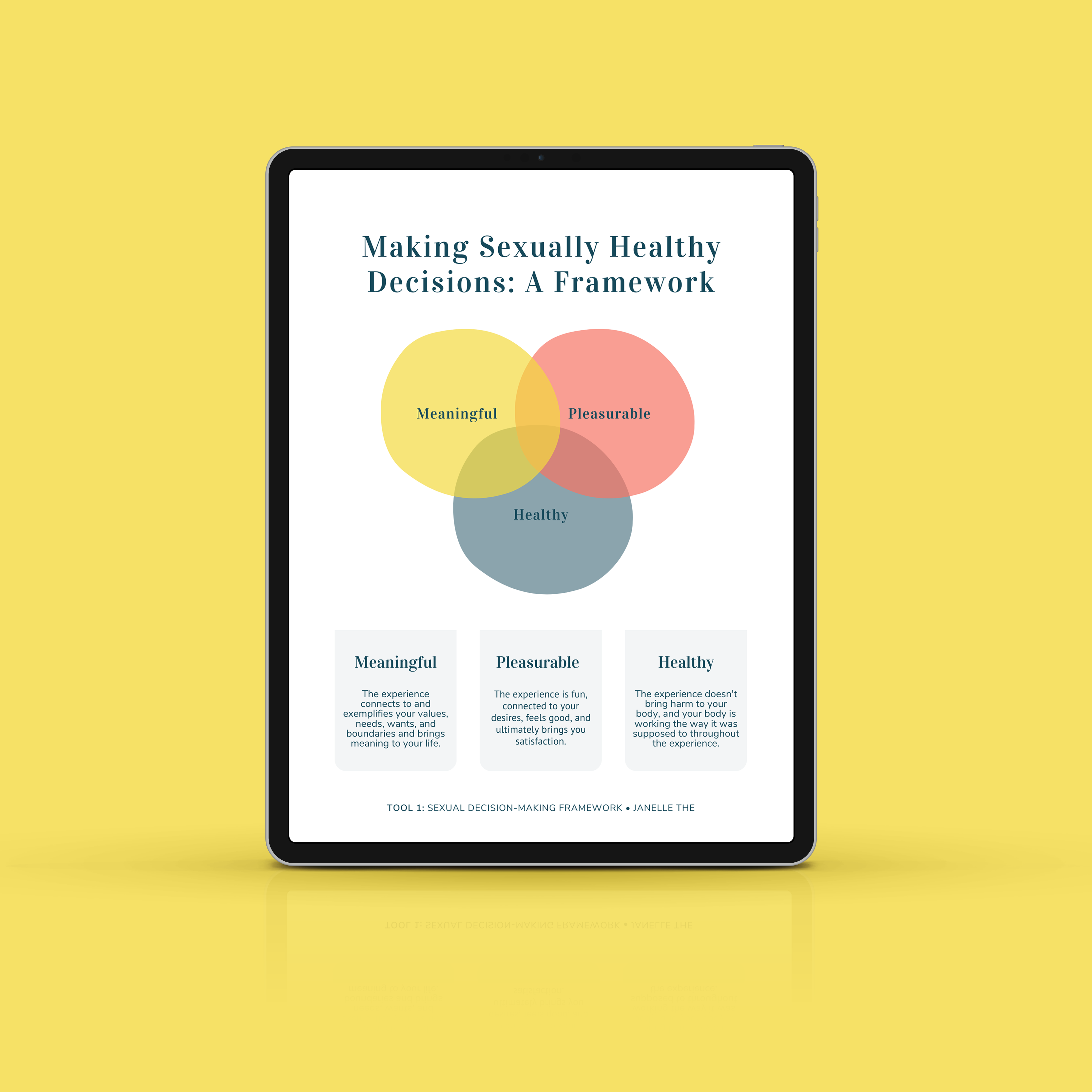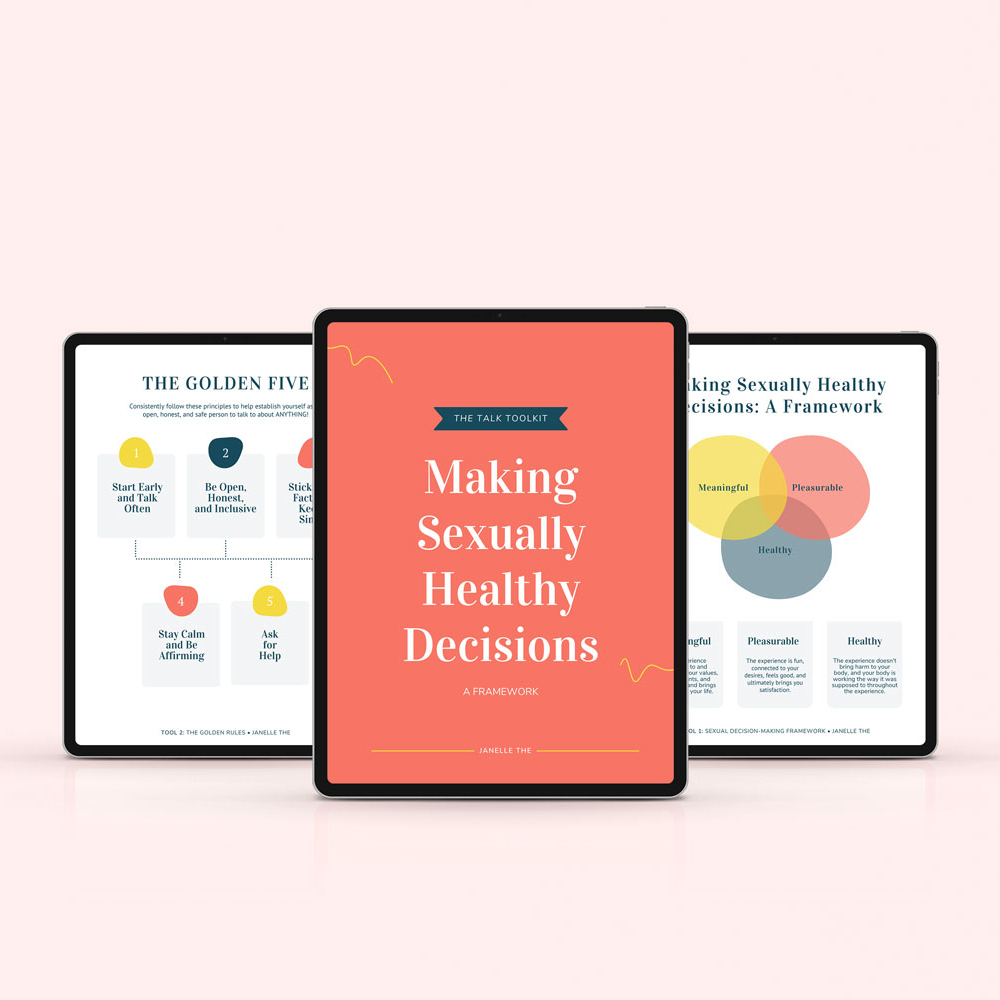“All sex is good sex, if you have consent and use protection.”
Have you heard (or said) this statement before? I’ll bet you’ve seen it while scrolling through social media or when a popular online sex educator spouts off something to the same effect.
If not, this is a super common statement in the sex-positive community. It’s everywhere and every single time I come across it, it gets my blood boiling. Why? Because it simply isn’t true – and all sex is NOT good sex!
I know this probably isn’t what you’d expect to hear from a modern sexual health educator. But I can’t scroll past another one of those social media graphics or TikTok videos and keep my thoughts to myself. It’s time to call this statement what it is….a dangerous misrepresentation of sexual health that threatens to harm the well-being of anyone who latches onto the phrase.
Now, before I send the wrong message, let me clarify something. What I think this phrase is trying to say is that a person’s worth is not determined by their sexual choices. Which I 100% agree with and wholeheartedly believe – your value and worth as a human being does not hinge on the sexual activity you choose to engage (or not engage) in. You. Are. Good. Full stop.
That being said, all sex is definitely not good sex and there are absolutely sexual choices that can profoundly harm a person’s well-being.

What’s wrong with saying all sex is good sex?
Now you may be wondering, “What exactly makes the statement ‘all sex is good sex’ so dangerous? I believe it comes down to three core aspects.
Let me explain.
1. It misrepresents what makes a sexual experience positive and enriching
First and foremost, to say that all sex is good sex if you have consent and use protection fundamentally misrepresents what makes a sexual experience positive and enriching (a.k.a. good sex). It implies that all you need for sex to be good is to have permission and to not get an infection/unexpectedly get pregnant.
But here’s the thing, everyone who’s ever engaged in sexual activity can tell you that sex is not quite that simple. In reality, establishing permission and using protection are just two factors of many that lead to a “good/pleasurable/enriching” sexual encounter (we’ll talk about this more in a minute).
2. It over simplifies consent.
Secondly, this statement implies that consent is simple, which it’s not. In truth, consent is anything but simple! It is as complex, nuanced, and confusing as the humans working to establish consent.
Now, I know a common retort to this statement is that consent is incredibly simple, it’s just a yes or no question and once you hear no, you just accept it and move on. While I agree that life would be less complicated if we could just easily say what we want, when we want it, and respectfully listen to others, that’s just not how humans work.
We are messy beings. We don’t always know what we want and don’t want. And when we do know what we want, we don’t always know how to confidently and concisely express our desires. Then, when we are able to express our desires, the people we’re connecting with don’t always accurately interpret what we’re trying to communicate.
If you’re not sure I’m right about this, I highly recommend listening to Malcom Gladwell’s “Talking to Strangers.” Or just think about some of your recent social interactions and how you navigated identifying, expressing, and advocating your desires and the desires of others.
3. It limits our ability to have nuanced conversations about sexual choices.
And thirdly, when we reduce the concept of good sex to getting consent and using protection, we grossly limit our ability to have nuanced conversations about sexual choices. Essentially, when it comes to judging sexual experiences we’re led to believe that an experience is either non-consensual and bad or consensual and good. Now this works fine in that non-consensual sex is harmful and bad. But it doesn’t always hold true if we equate consensual with “good.”
For example, let’s say a couple consents to having sex. But throughout the experience Person A is solely focused on their own pleasure and once they are satisfied, they end the encounter. Technically speaking, Person B gave willing and informed consent. However, it was not a good sexual encounter for Person B, as their needs didn’t appear to be considered by Person A. Yes, it was consensual and they weren’t asked or pressured to do anything they didn’t want to. But it wasn’t a pleasurable or enriching experience and Person B left feeling used and unsatisfied.
As a society, if we want people to have an optimal level of sexual health, we MUST have more open and honest discourse about the quality of sexual experiences. Yes, we need to make sure people understand what consent is and how to establish it. BUT we also need to understand that consent is only a piece of the puzzle of what make sex good.
As you can see, even though the phrase is trying to promote something good (i.e. your sexual choices do not define your worth), “all sex is good sex” has the potential to threaten the sexual well-being of anyone who (consciously or unconsciously) internalizes this message.
So how can we reframe this common narrative? I believe it all starts with understanding what exactly it means for sex to be good.
Get free access to the decision making framework.

So what actually makes sex good???
What is it that actually makes sex good? And how can we, as parents and sex educators, shift our language to better empower people to engage in enriching sexual experiences? I belive good sex can be defined as any sexual activity that truly enriches the well-being of everyone invovled! More specifically…
- Good sex is sex that deeply connects to a person’s values, needs/wants, and boundaries.
- Good sex happens when everyone respects, listens to, and honors each other.
- Good sex is reciprocal and mutually satisfying.
- Good sex makes a person to feel safe and secure.
- Good sex brings sustainable joy and pleasure (before, during, and after a sexual experience)
And while you cannot have good sex without consent, having consent alone does not guarantee “good” sex.
Why doesn’t consent automatically equal good sex?
When we look at the relationship between consent and good sex, it’s important to clarify what consent actually is. Consent on its own is simply the act of establishing permission. And here’s the thing about permission…
- Permission is not automatically means an experience deeply connects to a person’s values and needs.
- Permission is not a commitment to be respectful and kind.
- Permission is not a promise of reciprocity and mutual satisfaction.
- Permission does not equal emotional safety and security.
- Permission alone cannot bring joy and pleasure.
Plain and simple, permission does not equal good sex as it does not guarantee joy, pleasure, or any other sort of positive outcome.
The danger of saying all sex is good sex
Perhaps now you can see why I have such a problem with proclaiming that consensual sexual activity automatically equals good, enriching, and empowering sexual experiences?
As sex educators, if we continue to push the idea that consent is all it takes for a sexual experience to be good (enriching/empowering/uplifting), we fail to adequately equip those we’re entrusted to teach with the knowledge and skills needed to think critically and make enriching sexual choices.

Here’s how I’m reframing the conversation for my children and students.
In my home and in my classroom, rather than proclaiming that a two-item checklist will automatically result in positive experiences, my children and students will hear a much more authentic message. Yes, the conversation will include consent and protection, but it won’t stop there. I have much higher expectations for their learning:
- They will learn that like all human interactions, sexual encounters are complex and complicated, requiring consideration and care.
- They will learn vital social and emotional skills they’ll need to navigate sexual encounters.
- They will learn that to be able to engage in truly good sexual experiences, they’ll need to understand their values, needs/wants, and boundaries, and be able to actively honor and exemplify said values, needs/wants, and boundaries.
- They will know that good sex can only happen when there is mutual care, respect, and reciprocity.
- They will know that while consent is a necessity, it is hardly the only thing to judge a sexual experience by. Because at the end of the day, consent is just permission, and permission isn’t enough to make sex good.
- Most importantly, they will learn that their sexual choices do not define their worth and value as a human being. They will know that they are wholly and completely good.
So, the next time you hear or are tempted to say “all sex is good sex…”
I challenge you to do a quick reframe and, instead, replace it with this much more accurate understanding, “All consensual sex has the power to be good/pleasurable/enriching IF each person is actively choosing to engage in an experience that exemplifies and honors their values, needs/wants, and boundaries.”
I know it’s not as sexy and catchy as “all sex is good sex.” But it’s much more accurate, and internalizing this truth actually has the power to positively impact a person’s sexual well-being.


